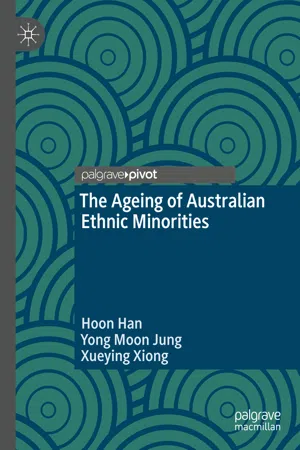This chapter introduces ageing-related issues that are of paramount significance on the global scale as the world embarks on becoming an ageing society. Population ageing—the increasing proportion of aged people in the population—is challenging many countries worldwide. Coulmas (2007) defined three types of society based on the proportion of the population aged 65 years and over: (a) an ageing society, in which the proportion is 7–14 per cent; (b) an aged society, in which the proportion is 14–21 per cent; and (c) a hyper-aged society, in which the proportion is over 21 per cent. A dramatic number of countries were ageing and aged societies already in 2015. Countries like Greece (21.4 per cent), Italy (22.4 per cent), and Japan (26.3 per cent) even became hyper-aged societies, with more than 20 per cent of their total populations aged 65 years and over. As such, population ageing will have significant impacts for human life in many aspects and will urge transformation in almost all social sectors (United Nations 2015).
The Research Gap
A key recurring issue of a global ageing society is how to cope with the imminent surge in the aged population. According to a United Nations (UN) report (United Nations 2015), changes in the age structure of the population will have profound implications for labour and economic markets, services (including social and medical services), transportation, housing, commodities, and even family structures and international exchange (United Nations 2015). Researchers have gone beyond health and financial considerations by analysing the impacts that population ageing will have on the achievement of broader planning and housing goals (Kim and Han 2014; Han and Corcoran 2014; Gleeson 2014). These studies largely focus on housing career and mobility decisions in later life and commonly address ‘ageing in place’ and ‘retirement migration’ (Clark 2013; Gleeson 2014; Beer et al. 2011). Recent Australian studies have extended the research on the links between mobility and housing by examining downsizing. Downsizing into a smaller dwelling is often accompanied by a reduction in personal belongings (decluttering), lifestyle changes, and, occasionally, reducing housing value or equity as a financial strategy (Judd et al. 2014; Ong et al. 2013).
From the international perspective of population ageing, the globalisation of international migration will change the demographics of ageing populations across the world (Castles and Miler 1998). Some studies argue that most of those who migrate to different nations have relatively disadvantaged backgrounds (Torres 2012), while others recognise that the globalisation of international migration does not necessarily accept the general assumption that all migrants are relatively poor and uneducated (Castles and Miller 1998). They will, in the long term, need appropriate housing and health service provision, which significantly affects the migration decisions made.
While there exists a large pool of studies on the topic of population ageing and migration in later life, the insights offered have only been partial and little has been done to deliver a comprehensive picture of the quality of life specific to older people with culturally and linguistically diverse (CALD) backgrounds. This represents a critical gap in the evidence base because ageing people from CALD backgrounds in Australia are a distinctly different cohort from the rest of the population in terms of their values and expectations. Older people from CALD backgrounds are not homogenous either. They have different personal experiences and backgrounds, which lead to diverse difficulties in their immigration lives (FECCA 2015).
Traditionally, it has been assumed that in older age, mobility is low and housing aspirations are limited. However, a distinct shift in this notion has accompanied the ageing of people from CALD backgrounds who may have been more or less disadvantaged in education and labour market opportunities and have lower or higher levels of wealth than the rest of the ageing population. Older people from CALD backgrounds increasingly prioritise independence, individuality, and lifestyle choices over traditional norms associated with family obligations (Quine and Carter 2006; Beer et al. 2011).
Figure 1.1 shows the three broad processes of an ageing society—population ageing, globalisation, and migration—that form the basis of recent ageing studies in areas such as transnational migration, healthy ageing and ageing well, and retirement migration such as ageing in place and downsizing. However, the aspirations and needs of older people, particularity those from CALD backgrounds, remain ...
